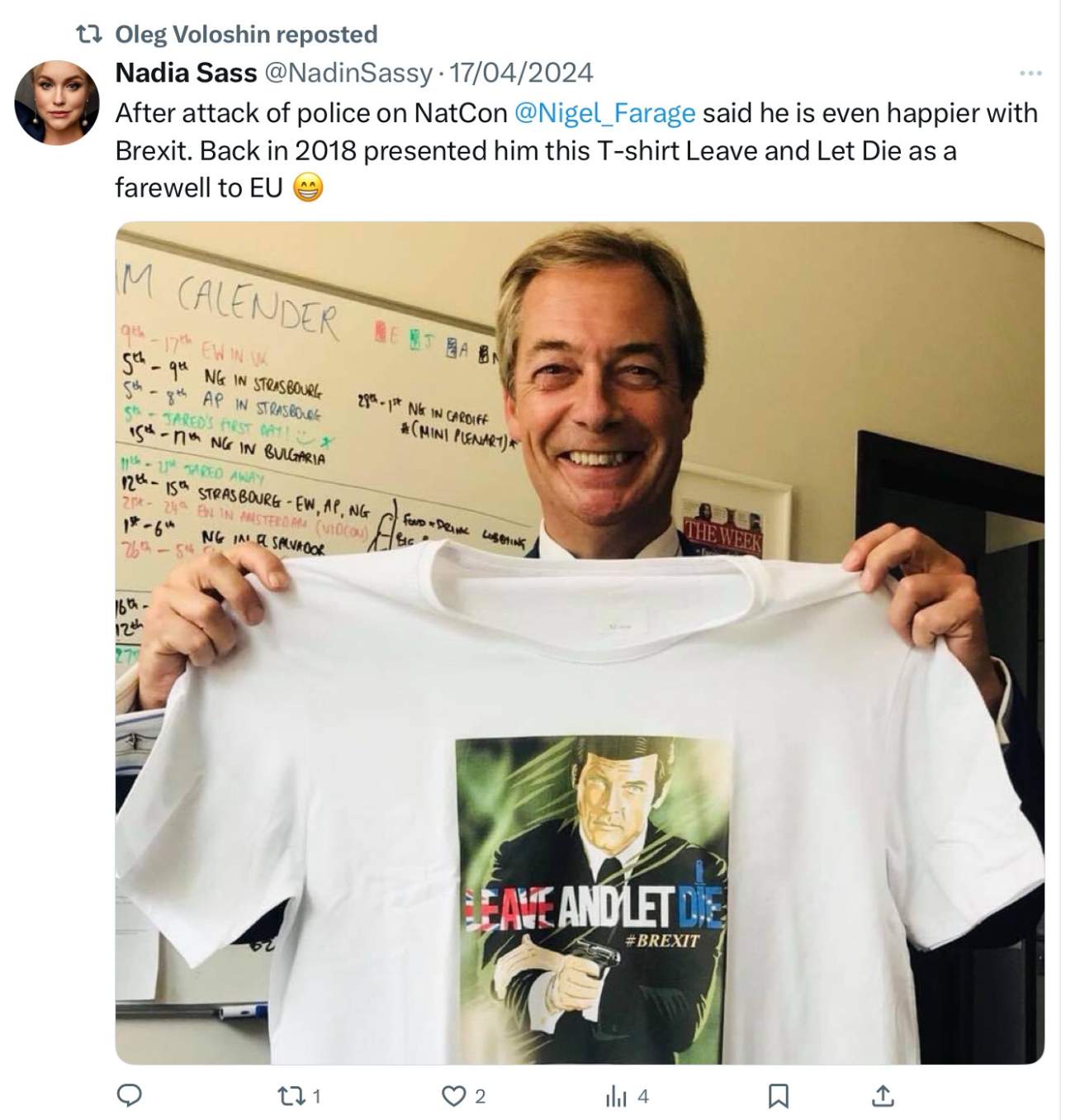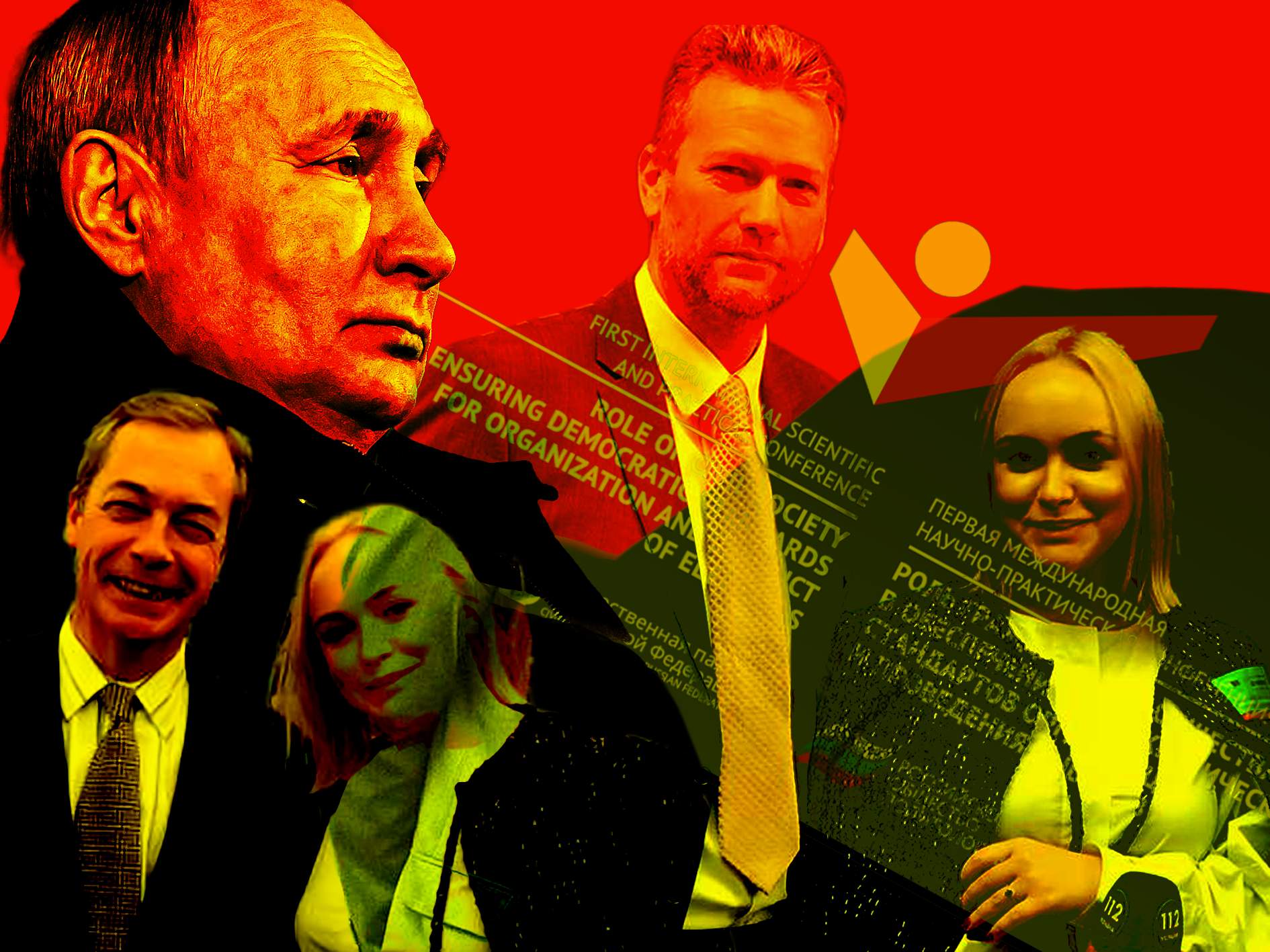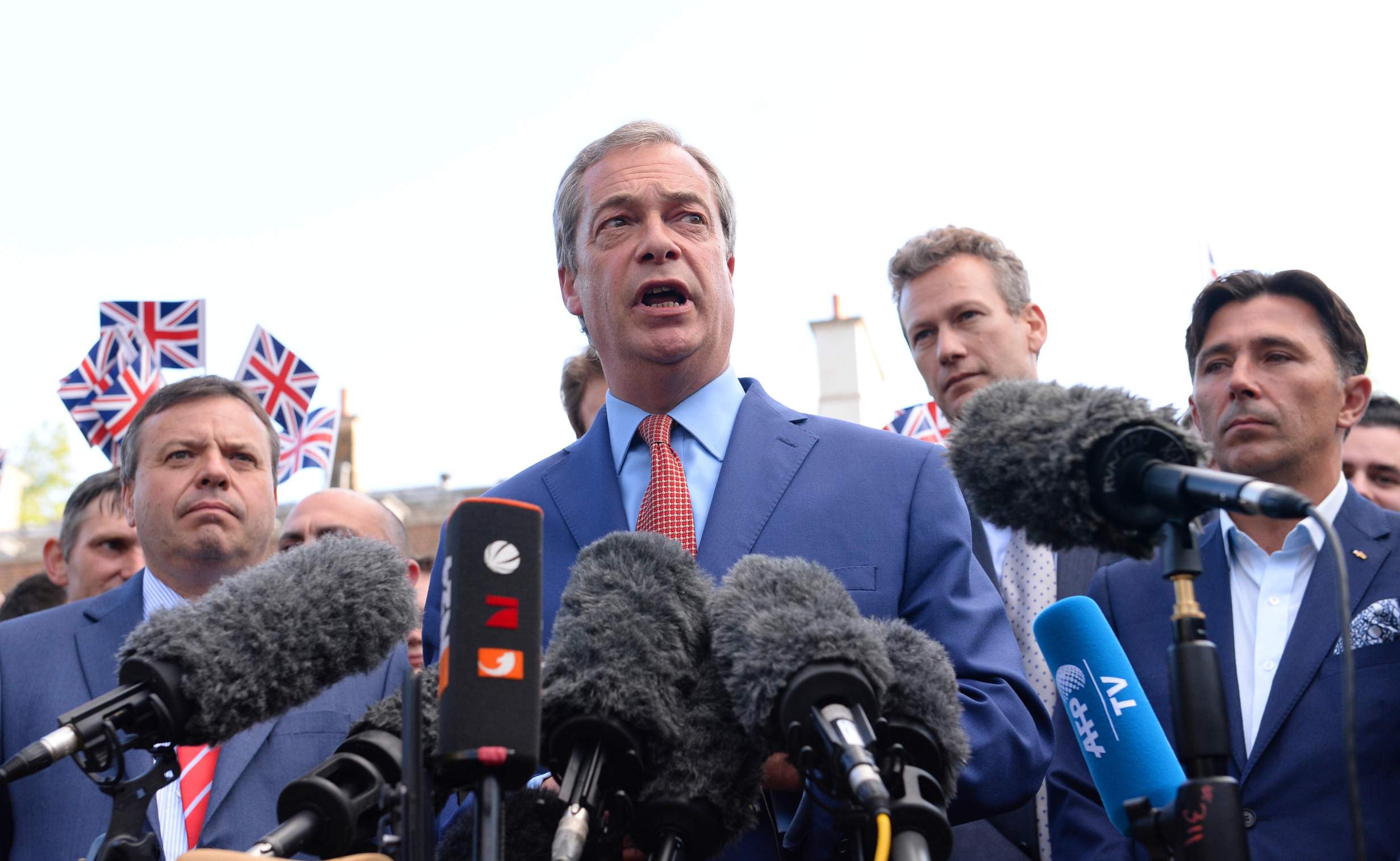
Read our Monthly Magazine
And support our mission to provide fearless stories about and outside the media system
When police stopped Nathan Gill at Manchester Airport on 13 September 2021, they did so under Schedule 3 of the Counter-Terrorism and Border Security Act 2019 – a power designed to detect hostile-state activity and foreign interference at UK borders.
Byline Times and The Nerve can now reveal that, when Gill was arrested, the former MEP had been invited to spend four days in Moscow at a major gathering of ‘political technologists’ from across the world, under the auspices of the Kremlin.
According to the Crown Prosecution Service indictment and Gill’s own pleas, he accepted bribes from December 2018 to July 2019 from Oleh Voloshyn – a pro-Russian Ukrainian MP with longstanding ties to Viktor Medvedchuk, Vladimir Putin’s closest political ally in Ukraine.
This new revelation ties Farage’s closest aide even more directly to Russia and its state influence operations.
And, in a week when Reform UK celebrated becoming the first ever political party in the UK to receive cryptocurrency donations, we can also reveal that Gill had prepared a presentation about the electoral role of cryptocurrencies for his Russian sponsors.
From Ukraine to Russia with Love
When Nathan Gill pleaded guilty to eight counts of bribery at the Old Bailey, for taking money to issue statements favourable to Russia while he was a UKIP and Brexit Party MEP, it was the first case under the Bribery Act for foreign political interference.
And it provided further proof that Nigel Farage’s parties – like many other right-wing Eurosceptic groups across the continent – were consistently targeted by Putin’s intelligence services and their proxies.
Five days after the first payment was made in December 2018, Gill – then a UKIP MEP – made a statement in the European Parliament to protest the planned closure of Medvedchuk’s TV stations 112 Ukraine and News24. He was interviewed by the TV station’s presenter and the wife of the man who had bribed him, Nadia Borodi (also known as Nadia Sass).
Borodi was also pictured with then UKIP Leader Nigel Farage – who sat as an MEP alongside Gill – outside the European Parliament building in Strasbourg, and then apparently inside Gill’s parliamentary office.
The bribes from Voloshyn continued until July 2019, when Gill was one of the few UKIP MEPs to join Nigel Farage’s new Brexit Party.
According to his then fellow MEP Rupert Lowe – who now sits as an independent MP in the UK Parliament after being suspended by Reform UK – Gill acted as the whip for Brexit Party MEPs. In a recent statement, Lowe described being called to a meeting by Gill at the European Parliament, where those in attendance claimed to be “very close to Putin”.
This coincided with a roundtable event Gill hosted for Viktor Medvedchuk, during which ‘Moscow’s man in Ukraine’ announced a new ‘peace plan’ for the country, which he then celebrated with President Putin the next day in the Kremlin, boasting of the support of British and other MEPs.
According to sources Byline Times has spoken to, Farage and Gill were “as thick as thieves” during this period, and it would have been “inconceivable” that Farage could not have known about Gill’s Ukrainian connections and statements.

Farage himself has admitted that he knew Gill for some years and warned him about going to Ukraine – because it is “one of the most corrupt countries in the world”, as he recently described it to the BBC.
But what about Russia, deeply entwined in its post-Soviet corruption through the institution of a mafiya state, which has often been praised by Farage?
A Reform UK spokesperson told Byline Times that Farage did not know about Gill’s planned trip to Moscow. Following this newspaper’s inquiries, Farage took to the airwaves to tell Bloomberg – in an uncharacteristically informal turn of phrase for the Reform Leader – that Vladimir Putin is “a very bad dude”.
Notwithstanding these late disavowals, the historical record of the Moscow gathering in late 2021, as Putin was planning his full invasion of Ukraine, reveals the ideological and technological convergence between the Kremlin’s interests and those of authoritarian right-wing parties in other countries.
‘A Digital Coup’
The Kremlin-backed International Forum on ‘The Role of Civil Society in Ensuring Democratic Standards of Organising and Conducting Elections’, which Nathan Gill was due to attend, took place over four days, with registration beginning on 13 and departures on 16 September 2021.

The theme should have been ironic to anyone paying attention to global politics or Russia’s State Duma elections that took place a few days later.
By late 2021, thanks to dozens of official investigations – including the US Senate Intelligence Committee, the Council of Europe, and the UK’s own Intelligence and Security Committee – Russia’s attempt to subvert overseas elections through illicit loans, cyber attacks, and online influence operations was well known.
Putin had first practised these novel ‘hybrid warfare’ technologies on his own population in a form of social and media control that was dubbed ‘managed democracy’ in the 2012 Duma Elections.
That same combination of financial inducement and social media propaganda was deployed in Ukraine during the annexation of Crimea and invasion of eastern Ukraine in 2014, and then in the UK’s EU Referendum and Donald Trump’s US presidential campaign in 2016.
Five years later, any pretence that the symposium Gill was invited to was really about “ensuring democratic standards” would have been risibly uninformed.
Gill was to join 250 core participants from at least 35 countries – mostly linked to far-right, Eurosceptic, or pro-Kremlin parties such as the Rassemblement National (France), AfD (Germany), Lega (Italy), Forza Italia (Italy), the Serbian Progressive Party, and the Action Party (Latvia).
Five roundtables brought together Russian political technologists and hand-picked foreign guests to validate the Kremlin’s new electronic-voting (DEG) platform – which was being rolled out in seven regions, including Moscow, and was being described as a new form of “sovereign digital democracy”.
However, when the elections took place a few days later, the Organisation for Security and Cooperation in Europe (OSCE) was not allowed to properly observe the count. Independent watchdogs such as Golos warned that the DEG technology created a “black box” for manipulating results. Russia’s then opposition leader Alexei Navalny called the new electronic voting platform a “digital coup”.
Yet, the first roundtable at the Moscow State University conference a few days before argued that OSCE monitoring should be replaced by “independent civic observers” aligned with Russia.
The two right-wing French politicians at that roundtable, Thierry Mariani (a Rassemblement National MEP) and Yves Pozzo di Borgo (a former French senator), were detained and questioned in Paris two weeks later as part of a separate French judicial investigation into undeclared Russian funding.
Had he not been arrested, Gill would have presented a talk entitled ’The Same Technology That Gives Us Crypto Currencies Also Will Change the Way That We Vote’. As it was, Russian academics presented papers on “algorithmic trust” and “AI-assisted voter engagement”, portraying technology as a way to centralise electoral management.

The Security Background
It now appears that Nathan Gill’s arrest was part of a Europe-wide investigation into Russian influence and intelligence operations.
Four months before, in May 2021, Polish counter-intelligence detained Janusz Gabriel Niedźwiecki, a lobbyist who had worked alongside Gill at pro-Russian civic events.
According to Poland’s Internal Security Agency (ABW), Niedźwiecki was charged with espionage for Russia. His organisation – the European Institute of Democracy and Social Affairs – operated under the Kremlin’s soft power agency, Rossotrudnichestvo, the same body that co-sponsored a Moscow State University forum Gill would later attend.
During the raid, ABW seized files proposing “Eurasian dialogue” conferences linking British, Czech, and German populist parties. One memo, investigators told Gazeta Wyborcza, outlined plans to “broaden cooperation with British delegates formerly active in the European Parliament”.
At the heart of what Polish prosecutors described as a “hybrid influence chain” were Oleh Voloshyn and his partner Nadia Borodi – who had by now fled to Belarus – via their website Voice of Europe.
After Voloshyn’s role in suborning Gill, the couple went from strength to strength. By November 2024, they were arranging trips to Sochi for senior German AfD politicians to meet none other than Dmitry Medvedev, Russia’s former President and head of Putin’s United Russia party.
Czech authorities sanctioned the Prague-based Voice of Europe website in March 2024.
There was a four-year gap between Gill’s arrest and his guilty pleas. Since then, there has been ample evidence of Russian spy rings engaged in sabotage, surveillance and potential assassination in the UK, often using Bitcoin to pay teenage recruits.
It is highly likely, given the direct involvement of senior Kremlin figures and at least four separate European security services investigating Gill and his associates, that British security services are conducting a deeper probe into Russian operations in the UK.
Byline Times has approached both the Secret Intelligence Service, MI5, and the Metropolitan Police Service’s Counter-Terrorism Command.
Further Questions for Farage
During this week’s Prime Minister’s Questions, when asked about the matter of Nathan Gill and Reform, Keir Starmer said that Nigel Farage and his Deputy Richard Tice – who worked closely with Gill during his time in Strasbourg – have “questions to answer” about what they knew of his Russian-aligned activity.
Gill’s planned attendance at this conference in Moscow is another indication of his continuing collaboration with Russian attempts to overthrow democratic norms.
In recent weeks, Farage has admitted that he had “known” Gill “for a very long time… in the European Parliament, in the UKIP days” and that, as a “God-fearing Christian”, he was “somebody that you would think was the least corruptible person that you know”.
But sources have told Byline Times that it was not a mere acquaintance. Nathan Gill has been a close associate of Nigel Farage since 2005. He was a senior figure during the Brexit Party era. He was the only one of 24 original UKIP MEPs to accompany Farage all the way to the Reform Party. When Reform UK was founded, Gill, as its Leader in Wales, occupied the only other official position in the party apart from Farage himself.
And what of his activities when he left Strasbourg?
When Gill failed to win a seat in the Welsh Parliament in May 2021, it was previously reported that he then left Reform. But this now looks less certain.
The claim was made to Nation Cymru by Reform sources six months after Gill’s arrest. There is no contemporaneous record of him leaving the party before the planned Moscow visit in September 2021, and Reform did not confirm either way when approached by Byline Times.
The question of how much influence Russia has on Reform and its leadership is particularly pressing because, if an election were conducted now, Nigel Farage’s party would likely win a parliamentary majority and he would become prime minister, according to polls.
Crypto Politics
Gill’s proposed talk at the Moscow conference about crypto and elections is also interesting in light of Reform’s plans for the future.
As well as using Bitcoin to finance spies overseas, the Kremlin deploys anonymous blockchain transactions to conduct the economic arm of its hybrid warfare.
Since 2022, the US Treasury Department has sanctioned multiple Russian entities for laundering propaganda budgets and state-linked funds through crypto exchanges – including the Internet Research Agency, the Trident and Bitzlato platforms, and the Hydra Market exchange used to disguise illicit political payments.
Despite this, on 29 May this year, Farage announced that Reform would become the first British political party to accept cryptocurrency donations, updating its website the same day to enable crypto giving under Electoral Commission rules. According to the Guardian, the new page offered Bitcoin, Ethereum, and other options – describing the move as “the future of political giving”.
Farage told supporters that it would “free us from the tyranny of the banks”. However, anti-corruption experts – including RUSI’s Centre for Finance and Security and Transparency International UK – warn that crypto could become a new frontier to further infiltrate unregulated foreign funding.
Radom, the company which processes Reform’s crypto payments, is not regulated by the Financial Conduct Authority and its anti-money-laundering supervision because it is based in Poland.
Meanwhile, the Electoral Commission has begun reviewing the legality of crypto donations and their untraceability, citing concerns about “digital anonymity in political financing”.
Labour MP Matt Western, Chair of Parliament’s National Security Strategy Joint Committee, told Byline Times that he has “real concerns around cryptocurrencies” in political funding.
Speaking in a personal capacity and not on behalf of the committee, Western said that there are “core issues” in their use and there are questions they raised “around transparency, traceability, and rapidly variable values – meaning that an amount donated could rapidly increase in value despite having been declared at a lower received value”.
And yet, here is one of Farage’s closest allies at the time, willing to travel to Moscow and take part in discussions on how to subvert democracy with Russian big tech – already having been bribed to push Russian propaganda – and championing the same crypto technology that is now being used to finance Reform in the UK.


